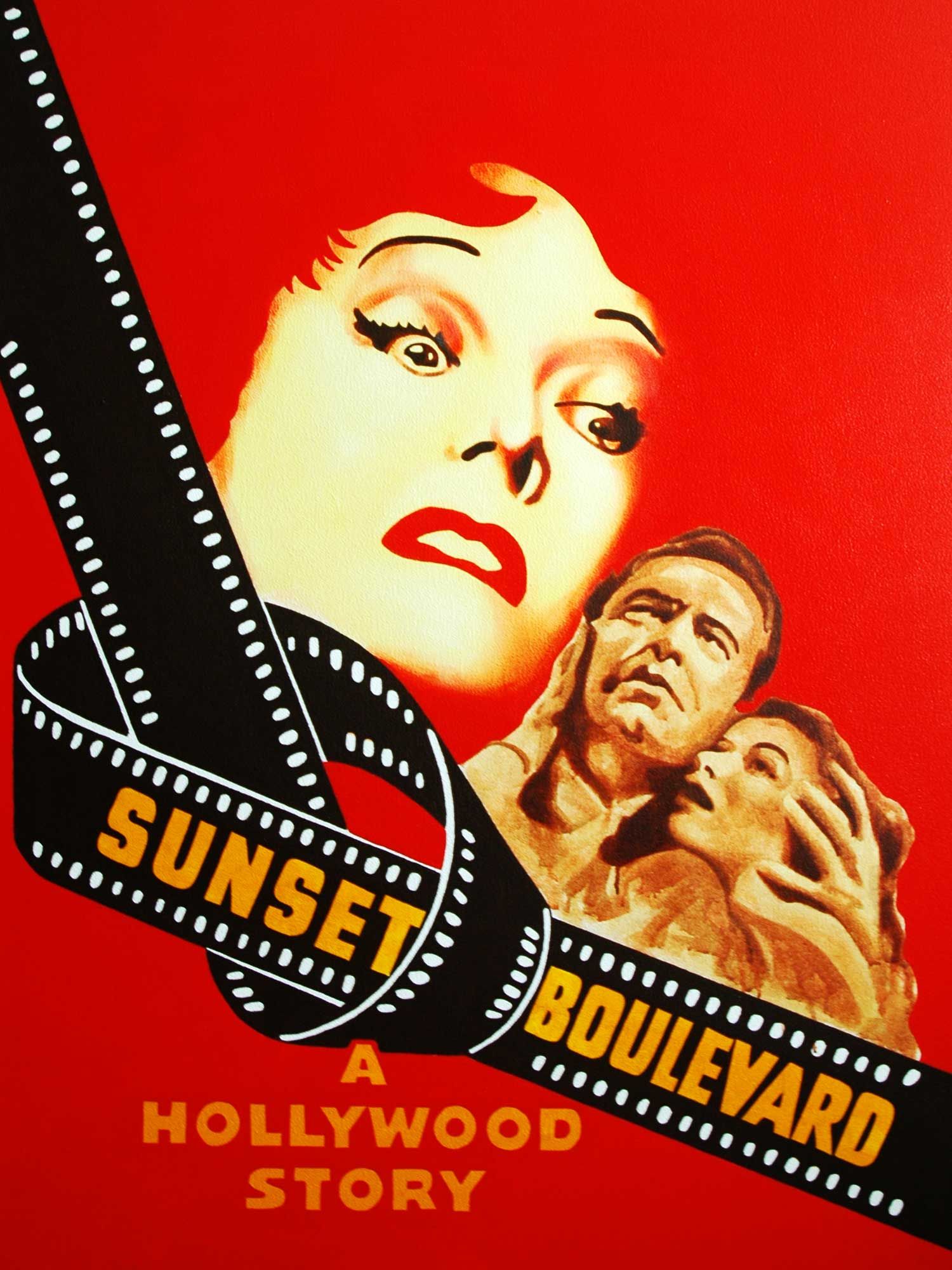
06 Nov NOIRVEMBER: Sunset Boulevard
SUNSET BOULEVARD
dir. Billy Wilder, starring William Holden, Gloria Swanson, and Nancy Olson
As a child, Hollywood seemed like a fairy tale long since passed. Sure, Tinseltown was still making blockbusters in the 90s that I would go on to adore, but the Golden Age that so many classic movies spoke of definitely didn’t feel within reach. One movie that certified that feeling for me was Billy Wilder’s Sunset Boulevard – a tale of lies, broken dreams, and ill-fated romance that all took place amid the fading sparkle of Hollywood. It was a movie I was too young to see at the tender age of 7. Yet, with its haunting cinematography and iconic performances, I was hooked, making the experience of watching it disappointment-proof from its first frame to its last.
So, when I was asked to discuss a film noir to review, I had to pick this gem. But what exactly made me, a girl with vampire-shaped teeth and language-processing issues, obsessed with “Sunset Boulevard” at such a young age? There are too many reasons to answer quickly, though I hope the paragraphs below will do the trick.
Spoilers for a 70-plus-year-old movie ahead….
Sunset Boulevard opens with audiences witnessing the aftermath of Joe Gillis’ (William Holden) death. There, lying dead in a pool, Joe tells us how his life ended. We learn that he was a down-on-his-luck screenwriter who just happened to find hiding in a grand mansion. There he met Norma Desmond (Gloria Swanson), a once great star of the silent film era whose popularity had disappeared into the background. The film then details the complicated relationship between Gillis and Desmond – one that (obviously) changes their lives in more ways than one.
When you first watch Sunset Boulevard, you’re likely to have one of two reactions: you either “get it” or you don’t – and by “it,” I mean Wilder’s unique choices. For example, how many movies begin with a dead character narrating the story? In and before the 1950s, only a few. Yet no matter how many people claimed his decisions to be taboo, Wilder was never known for playing it safe. And that confidence clearly paved the way for future filmmakers to do whatever they liked with their narrative structure, even if it took decades for the right audience to understand it.
That kind of rebellious energy makes Wilder’s work so addicting to watch, and, in the case of Sunset, it propels protagonists like Joe Gillis to be even more intriguing to follow. Played by the cold-but-calculated Holden, Joe is a guy who, at first, you can’t quite read. He’s a man who feels like the world has kicked him around too many times, resulting in the sparkle he once had for show business starting to fade away. As a result, he becomes a crunchy individual who couldn’t find luck if it hit him in the face. Yet that acceptance of defeat makes Joe’s emotional journey a thrilling watch, especially once audiences cross paths with his two fellow co-stars.
We (and Joe) first encounter Betty Schaefer (Nancy Olson), a beautiful 22-year-old script reader who still believes in the magic of movies deep down in her soul. At first, Joe sees her as a pest – an annoying kid who still hasn’t been crushed by the studio system. But as time passes, Joe eventually views Betty more as a creative equal and, even more importantly, as a romantic interest. Ultimately, Betty represents the better person that Joe wants to be – an optimistic figure who lives a much more normal life. The kind of life that Joe will obviously never have.
But on the other side of the coin, we have, of course, Norma. Draped in stunning art-deco meets gothic perfection, Norma is a character who represents not only the tragic figures of the past but also the horrific effects beauty standards have on women, even today. She’s sometimes a vampire of her own making who sucks the lives out of those around her. But in other ways, she’s a misunderstood heroine searching for acclaim and affection. And while on paper, it might be impossible to feel sympathy for such a ridiculous character, Swanson’s Academy Award-nominated performance gives an angle of humanity to this larger-than-life figure.
From her exaggerated line delivery to the operatic-like steps she takes down the staircase, it’s clear why Gloria Swanson’s take on Norma has defined the character. She’s both campy and catastrophic, beautiful and horrific. But what gives Swanson’s portrayal an extra boost is the fact that she was, indeed, a silent film star. One whose popularity rose and fell just like Norma’s own. It’s an aspect that Wilder loves to comment on, primarily when he features one of Swanson’s films, “Queen Kelly,” during a scene where Norma is showing Joe her past work. What makes things even crazier is that the movie was directed none other by the actor who plays Norma’s butler/ex-husband, Max, aka Erich Von Stroheim.
This example of Wilder’s blending of homage and criticism within Sunset is the biggest reason I find myself returning to it so frequently. Truth be told, you only see a few movies that express the magic of Hollywood while simultaneously tearing it down limb from limb. As a child, who was raised on the magical qualities of Tinseltown by her TCM-loving grandparents, it was refreshing (and somewhat shocking) to be shown a film that balanced its admiration and harsh commentary so well.
Now, I’m sure many of you are wondering: When are you gonna talk about the film noir parts of this film? That’s why you’re here in the first place, so it would make sense to be curious. The thing about Sunset Boulevard that makes it such a unique choice for this theme is that it doesn’t follow the typical conventions of the genre. Norma is far from the usual femme fatale, as is Betty; there’s no great mystery to be solved because audiences already know the ultimate outcome, and Joe isn’t precisely a Humphrey Bogart type. But that’s what makes “Sunset” such a fascinating example of film noir – it breaks the rules and creates new ones along the way.
Something Sunset Boulevard does have in common with other great film noirs is its cinematography and its musical score. John F. Seitz does a beautiful job of making every frame drip with a unique art-deco-meets-gothic sensibility. At the same time, composer Franz Waxman gives a horror film-like thrill with his memorable compositions, particularly during the movie’s iconic, chilling finale. Overall, these two elements combine to make Wilder’s chaotic, tragic world feel even more out of a folktale than it would have without these touches.
Simply put, Sunset Boulevard is one of my favorite movies because it (as Donkey from “Shrek” would agree) is a parfait-like experience. It has a layer that tells an incredibly well-crafted story, but underneath that, deliciously comments on the circus that is Hollywood. Sure, it might not be every cinema-lovers cup of tea, but for those willing to embrace Wilder’s oddities, it’s a classic example of why he was a filmmaker like no other., proving that great movies are the ones that admit to the flaws of the system that created them in the first place.
Review by Dalin Rowell. For more from Dalin, click here: https://thefadedreel.com/


No Comments